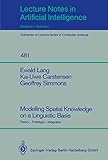Modelling Spatial Knowledge on a Linguistic Basis [electronic resource] : Theory-Prototype-Integration / by Ewald Lang, Kai-Uwe Carstensen, Geoffrey Simmons.
Material type: TextSeries: Lecture Notes in Computer Science, Lecture Notes in Artificial Intelligence ; 481Publisher: Berlin, Heidelberg : Springer Berlin Heidelberg, 1991Description: IX, 140 p. online resourceContent type: text Media type: computer Carrier type: online resourceISBN: 9783540470519Subject(s): Computer science | Artificial intelligence | Computer Science | Artificial Intelligence (incl. Robotics)Additional physical formats: Printed edition:: No titleDDC classification: 006.3 LOC classification: Q334-342TJ210.2-211.495Online resources: Click here to access online
TextSeries: Lecture Notes in Computer Science, Lecture Notes in Artificial Intelligence ; 481Publisher: Berlin, Heidelberg : Springer Berlin Heidelberg, 1991Description: IX, 140 p. online resourceContent type: text Media type: computer Carrier type: online resourceISBN: 9783540470519Subject(s): Computer science | Artificial intelligence | Computer Science | Artificial Intelligence (incl. Robotics)Additional physical formats: Printed edition:: No titleDDC classification: 006.3 LOC classification: Q334-342TJ210.2-211.495Online resources: Click here to access online  E-BOOKS
E-BOOKS
| Current library | Home library | Call number | Materials specified | URL | Status | Date due | Barcode |
|---|---|---|---|---|---|---|---|
| IMSc Library | IMSc Library | Link to resource | Available | EBK5966 |
A linguistic approach to spatial knowledge -- The implementation of OSKAR -- The integration of OSKAR into the LILOG system.
On the basis of a semantic analysis of dimension terms, this book develops a theory about knowledge of spatial objects, which is significant for cognitive linguistics and artificial intelligence. This new approach to knowledge structure evolves in a three-step process: - adoption of the linguistic theory with its elements, principles and representational levels, - implementation of the latter in a Prolog prototype, and - integration of the prototype into a large natural language understanding system. The study documents interdisciplinary research at work: the model of spatial knowledge is the fruit of the cooperative efforts of linguists, computational linguists, and knowledge engineers, undertaken in that logical and chronological order. The book offers a two-level approach to semantic interpretation and proves that it works by means of a precise computer implementation, which in turn is applied to support a task-independent knowledge representation system. Each of these stages is described in detail, and the links are made explicit, thus retracing the evolution from theory to practice.


There are no comments on this title.